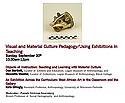Visual and Material Culture Pedagogy/Using Exhibitions in Teaching
September 30, 2012
10:30 AM-12:00 PM, WCC 233
Objects of Instruction: Teaching and Learning with Material Culture
Dan Bartlett, Curator of Exhibits and Education, Logan Museum of Anthropology, Beloit College
Nicolette Meister, Curator of Collections, Logan Museum of Anthropology, Beloit College
Handouts:
Bartlett and Meister Resource Guide
Undergraduate Museum Studies Programs in the United States
Beloit College--Labs Across the Curriculum
The Logan Museum of Anthropology, a teaching museum of Beloit College, strives to serve more than anthropology students: we seek to expand the use of collections into all campus disciplines. To that end—and promoting Beloit’s credo of putting the liberal arts into practice—Logan staff developed what we call Visual and Material Culture Pedagogy. This is a teaching and learning model based on artifact analysis that situates objects at the center of instruction. The model employs visual learning principles and can be applied across disciplines to foster critical thinking and engage learners in new ways. We collaborate with faculty through workshops and partnerships to facilitate application of this model to the collections. To illustrate these efforts, this presentation introduced Material and Visual Culture Pedagogy and gave examples of successful course modules that have resulted from this work. It presents a model for collections use by diverse faculty in almost any department, and it provides examples demonstrating the possibilities of using museum objects in undergraduate teaching.
Before coming to Beloit College, Dan Bartlett was the curator of exhibits at Midway Village Museum in Rockford, Illinois, where in addition to exhibit work he developed and presented programs, workshops, and lectures for children and adults. His exhibit work at Midway Village has been recognized by theIllinois Association of Museums (IAM) and the American Association for State and Local History (AASLH). At the Logan Museum of Anthropology, Dan is responsible for developing new exhibits and educational programming. He teaches courses on exhibit design and development, and museum education in Beloit College’s museum studies program. Particular interests include using objects in formal and informal learning environments and how people learn from museum exhibits. Degrees: University of Wisconsin-Superior, B.F.A.; University of Wisconsin-Milwaukee, M.A. in public history and museum studies.
Nicolette Meister's museum experience includes collections work at the University of Colorado Museum of Natural History, Denver Art Museum, Pitt Rivers Museum of Ethnology and Archaeology, andMilwaukee Public Museum. Nicolette is responsible for the Logan Museum’s collections and also teaches Introduction to Collections Management in Beloit College’s museum studies program. Her interests include Native American ethnology, Oceanic ethnology, museum representation, tribal museums, and tourist art. Degrees: University of Wisconsin-Milwaukee, B.A. in anthropology; University of Colorado at Boulder, M.S. in museum studies and anthropology.
An Exhibition Across the Curriculum: West African Art in the Classroom and the Gallery
Kate Gillogly, Assistant Professor of Anthropology, University of Wisconsin-Parkside
The planned exhibition of a local collector’s collection of African art gave an anthropologist and an art historian the opportunity to collaborate in preparation for the show. Neither was an expert in this particular field. The anthropologist, Kate Gillogly, is a specialist in environment and development in Southeast Asia; the gallery director, Patricia Briggs, is an art historian and critic with an interest in modern visual art. This challenge became the basis for a semester-long project for Gillogly’s “Peoples of Africa” class.
Working on the exhibition brought home to students the great ethnolinguistic and historical diversity of this region as well as variations in ritual practice and cultural meaning. The process not only made the peoples and cultures of West Africa more immediate, but also highlighted the history of colonialism and the Western Gaze on the Primitive. Methodologically, the students learned the importance of verification and validation in qualitative historical work.
Kathleen Gillogly is an assistant professor of anthropology at the University of Wisconsin-Parkside. Although her research interests are in agricultural development, political ecology, and community organization/social dynamics in mainland Southeast Asia (Thailand, Laos, Vietnam, and Cambodia), her original work was in community development in the Soloman Islands (South Pacific), setting up the Kwaio Cultural Centre and guiding the revival of traditional arts through an arts cooperative run by the Kwaio people themselves. She also accompanied Kwaio artists to the Pacific Arts Festival in Papua-New Guinea and to a festival of Pacific arts at the Bishop Museum in Honolulu, HI. Her most recent article is Opium, Power, People: Anthropological Understandings of an Opium Interdiction Project; her co-edited collection Everyday Life in Southeast Asia was published in 2012 by Indiana University Press. Degrees: University of Hawaii, M.A.; University of Michigan, Ph.D.
Moderator:
Pamela Feldman-Savelsberg
Broom Professor of Social Demography and Anthropology; Director of African/African American Studies, Carleton College
